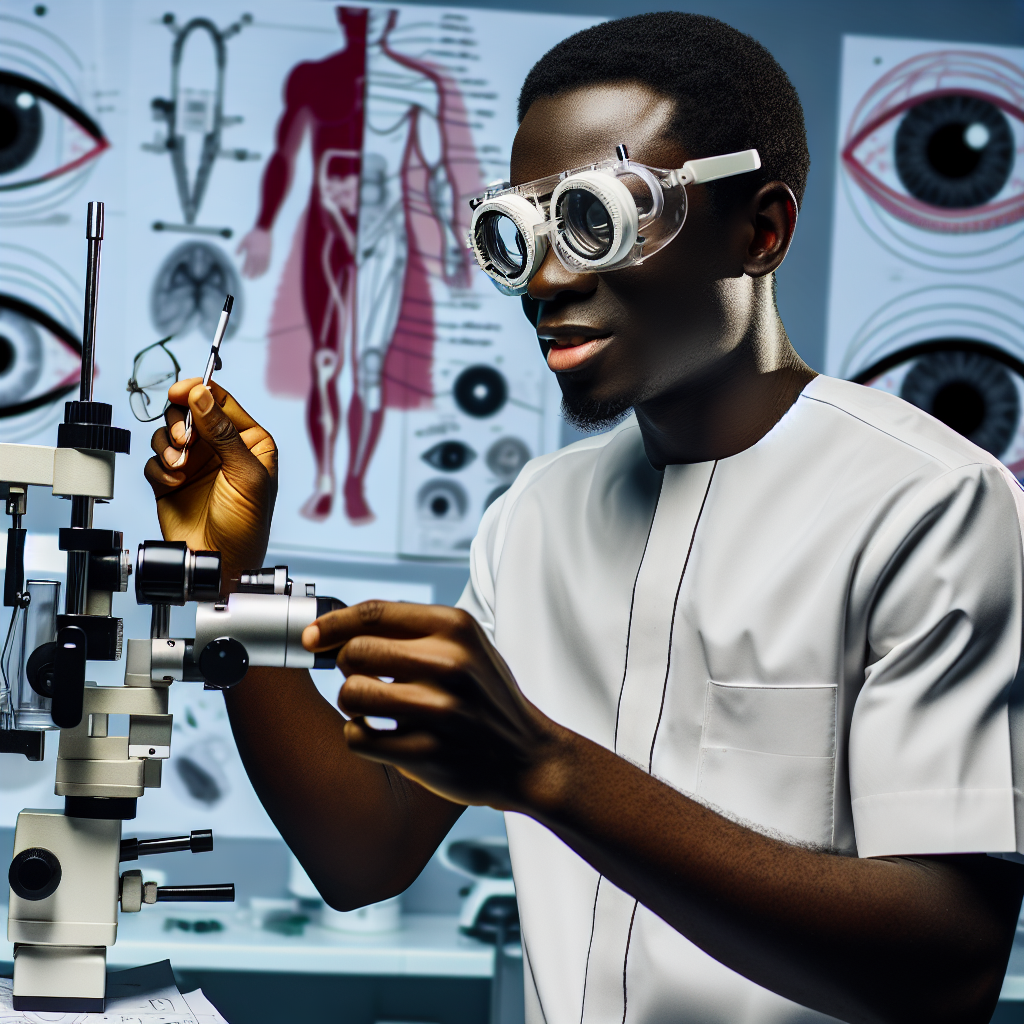Introduction
Ophthalmology is a branch of medicine that deals with the diagnosis and treatment of eye disorders.
It is crucial in maintaining vision and overall eye health.
Nigeria has made significant contributions to advancements in this field.
Historical Background
Ophthalmology, the branch of medicine that deals with the anatomy, physiology, and diseases of the eye, has a rich history in Nigeria.
Explore the history of ophthalmology in Nigeria
Medical practices related to eye care have been documented as far back as the pre-colonial era in Nigeria.
Traditional healers and medicine men would often be consulted for eye ailments.
However, the formal practice of ophthalmology as a medical specialty began to take shape in Nigeria during the colonial era.
British colonial rulers introduced modern medical practices, including ophthalmology, to the country.
Highlight key milestones and advancements made by Nigerian ophthalmologists
- One of the earliest Nigerian ophthalmologists of note was Dr. R.A.B Olusanya, who trained in the United Kingdom and returned to Nigeria to practice in the 1950s.
- Dr. Olusanya set up one of the first eye clinics in Nigeria, where he provided both clinical care and training for local ophthalmologists.
- Over the years, Nigerian ophthalmologists have made significant contributions to the field, with many pursuing further education and training abroad to bring back new knowledge and skills to the country.
Discuss the challenges faced by early practitioners
Early Nigerian ophthalmologists faced numerous challenges in establishing reputable practices and gaining recognition within the medical community.
- Lack of access to advanced medical equipment and technology hindered their ability to diagnose and treat eye conditions effectively.
- Limited funding and resources meant that many early practitioners had to rely on donations and goodwill to sustain their practices.
- Skepticism and mistrust from patients who were more accustomed to traditional healing methods presented additional obstacles for early practitioners to overcome.
In spite of these challenges, Nigerian ophthalmologists persevered and continued to innovate and make significant advancements in the field, paving the way for future generations of eye care professionals in the country.
Technological Innovations
Technological advancements have significantly transformed ophthalmology in Nigeria.
These advancements enhance the quality of eye care services across the country.
Overview of the Latest Technologies
Nigeria has embraced cutting-edge technologies in the field of ophthalmology.
This revolutionizes the way eye health is managed and treated.
These technologies have improved diagnostic capabilities and expanded treatment options.
They cater to various eye conditions.
- Teleophthalmology: Utilizing telecommunication technologies to provide remote eye care services, particularly in underserved areas where access to ophthalmologists is limited.
- OCT (Optical Coherence Tomography): A non-invasive imaging technology that allows detailed cross-sectional visualization of the retina, helping in the early detection and monitoring of retinal diseases.
- Laser Therapy: Advancements in laser technology have enabled precise and effective treatment of conditions like diabetic retinopathy and glaucoma.
- Artificial Intelligence: AI algorithms are being used to analyze large datasets of retinal images, assisting in the early detection of diseases such as age-related macular degeneration and diabetic retinopathy.
Examples of Innovative Devices and Equipment
Nigerian scientists and researchers have made significant contributions to the development of innovative devices and equipment.
These developments have improved the diagnosis and treatment of eye diseases.
- Low-Cost Fundus Cameras: Portable and affordable fundus cameras developed in Nigeria have made retinal imaging more accessible, especially in remote areas.
- Mobile Apps for Eye Screening: Mobile applications have been developed to facilitate eye screening and early detection of eye diseases, reaching a wider population.
- Adaptive Optics Systems: Nigerian scientists have developed adaptive optics systems that enhance the resolution of retinal imaging, allowing for more precise diagnosis of retinal conditions.
- Smart Glasses for Low Vision: Innovative smart glasses equipped with advanced optics and magnification features have been designed to assist individuals with low vision in improving their visual function.
Impact of Technology on Diagnosis and Treatment
The integration of technology into ophthalmic practice in Nigeria has had a profound impact.
It has improved the diagnosis and treatment of eye diseases.
This leads to better patient outcomes and increased efficiency in eye care services.
- Early Detection: Advanced imaging technologies have facilitated early detection of eye diseases, enabling timely intervention and preventing vision loss.
- Precision Medicine: Personalized treatment approaches based on advanced diagnostic tests lead to more accurate and targeted therapies for various eye conditions.
- Remote Monitoring: Teleophthalmology platforms allow for remote monitoring of patients with chronic eye conditions, ensuring regular follow-ups and improved disease management.
You Might Also Like: Financial Aspects of Anaesthesiology in Nigeria
Research and Development
One of the key aspects driving advancements in ophthalmology in Nigeria is ongoing research projects.
Researchers are exploring innovative solutions to address eye care challenges specific to the Nigerian population.
This research aims to improve diagnostic tools, treatment options, and overall patient outcomes.
By conducting studies focused on local needs, researchers are able to tailor interventions for better results.
- Current research projects in Nigeria encompass a wide range of ophthalmic issues such as cataracts, glaucoma, and diabetic retinopathy.
- Researchers are investigating new surgical techniques, medications, and diagnostic methods to enhance eye care services.
- Studies are also analyzing the prevalence of eye diseases in different regions of the country to guide targeted interventions.
- Collaborative efforts between research institutions and ophthalmic clinics are accelerating the translation of research findings into practice.
Importance of research in improving eye care and treatment outcomes
- Research plays a crucial role in enhancing the quality of eye care services and treatment outcomes for patients.
- By exploring new technologies and treatment modalities, researchers can offer more effective solutions to eye health problems.
- Evidence-based practices derived from research findings ensure that patients receive the most appropriate and beneficial treatments.
- Continuous research also aids in the early detection of eye diseases, leading to better prognosis and management strategies.
- Investing in research fosters a culture of innovation and improvement in ophthalmic care, benefiting the entire healthcare system.
Collaboration between Nigerian researchers and international institutions
- Nigerian researchers are increasingly forming partnerships with international institutions to leverage expertise and resources.
- Collaborations enable the exchange of knowledge, technology transfer, and joint efforts in addressing global eye health challenges.
- International collaborations provide Nigerian researchers with access to cutting-edge research tools and methodologies, enhancing their capabilities.
- Joint projects between Nigerian and foreign researchers result in the development of innovative solutions with a broader impact.
- These partnerships also facilitate the dissemination of research findings on a global scale, contributing to the advancement of ophthalmology worldwide.
Discover More: Notable Nigerian Microbiologists and Their Work
Training and Education
Ophthalmology training in Nigeria is a crucial aspect of producing competent eye care specialists.
The training programs in the country are designed to equip ophthalmologists with the necessary skills and knowledge to provide high-quality eye care to the Nigerian population.
There are several ophthalmology training programs in Nigeria, including those offered by teaching hospitals, universities, and specialized eye care institutions.
These programs focus on both theoretical knowledge and practical skills, ensuring that ophthalmologists are well-rounded in their abilities.
Continuous education is essential for ophthalmologists to stay abreast of the latest advancements in the field.
With rapid technological innovations and research breakthroughs, ophthalmologists need to engage in lifelong learning to deliver the best possible care to their patients.
Attending conferences, workshops, and seminars allows ophthalmologists to update their knowledge and skills.
They can learn about new treatment modalities and network with other eye care professionals.
Continuous education also helps ophthalmologists improve patient outcomes and enhance their professional development.
Role of Mentorship
Mentorship plays a vital role in grooming the next generation of eye care specialists in Nigeria.
Experienced ophthalmologists serve as mentors to young ophthalmologists, providing guidance, support, and mentorship.
This support helps them navigate their careers and develop their skills.
Through mentorship, young ophthalmologists can learn from the experiences and expertise of their mentors.
Transform Your Career with Expert Guidance
Get personalized mentorship consulting that’s tailored to your unique path. Our expert advice is actionable and exclusive.
Get StartedThey can gain valuable insights and practical knowledge that they can apply in their practice.
Mentorship also fosters a sense of community and collaboration within the ophthalmology field.
This environment encourages knowledge-sharing and continuous improvement.
Moreover, mentorship helps to ensure continuity in the delivery of high-quality eye care services in Nigeria.
By passing on their knowledge and skills to the next generation, experienced ophthalmologists contribute to the sustainability and growth of the ophthalmology profession in the country.
Training and education are essential pillars of the ophthalmology field in Nigeria.
Ongoing learning, mentorship, and professional development are integral to producing competent, skilled, and compassionate eye care specialists.
These specialists can make a meaningful impact on the eye health of the Nigerian population.
Uncover the Details: Patient Experiences with Prosthetics in Nigeria

Community Outreach Programs
Nigerian ophthalmologists play a crucial role in community outreach and eye care campaigns.
- They organize free eye screenings in rural areas to reach underserved populations.
- These programs aim to detect and treat eye conditions at an early stage.
- Nigerian ophthalmologists educate communities on the importance of regular eye check-ups.
Raising awareness about eye health in Nigeria is essential for preventing vision loss.
- Many people in Nigeria lack access to eye care services due to various barriers.
- By conducting outreach programs, ophthalmologists can reach those in need of care.
- Increasing awareness can help individuals prioritize their eye health and seek treatment promptly.
The impact of outreach programs on reducing blindness and visual impairment is significant.
- Early detection through screenings can prevent progression to severe eye conditions.
- Treatment provided during outreach programs can improve quality of life for patients.
- By addressing eye health issues proactively, the prevalence of blindness can be reduced.
Delve into the Subject: Community Impact of Biomedical Technology Nigeria
Collaboration and Partnerships
Collaborations between Nigerian ophthalmologists and international organizations play a crucial role in advancing eye care services in the country.
Partnerships with global entities bring in a wealth of knowledge, expertise, and resources that are vital for enhancing the quality of eye care in Nigeria.
Benefits of partnerships in sharing knowledge and resources
- Exchange of best practices: Collaborations enable the sharing of innovative techniques and best practices in ophthalmology.
- Training and capacity building: International partnerships provide opportunities for training Nigerian ophthalmologists in the latest advancements.
- Access to cutting-edge technology: Collaborating with global organizations gives Nigerian eye care providers access to advanced equipment and technology.
- Research opportunities: Partnerships open doors for joint research projects that can lead to groundbreaking discoveries in the field of ophthalmology.
- Improved patient care: By working together, Nigerian ophthalmologists and international partners can improve patient outcomes and overall eye care services in the country.
Examples of successful collaborations that have improved eye care services in Nigeria
- The partnership between the Nigerian Ophthalmological Society and the International Agency for the Prevention of Blindness has led to the implementation of successful eye care programs across the country.
- The collaboration between Nigerian hospitals and organizations like Orbis International has resulted in the establishment of specialized eye care centers with state-of-the-art facilities.
- Partnerships with academic institutions abroad have enabled Nigerian ophthalmologists to participate in global conferences, workshops, and training programs, enhancing their skills and knowledge.
- Global health initiatives such as the World Health Organization’s Vision 2020 have worked closely with Nigerian eye care providers to reduce the prevalence of avoidable blindness in the country.
- The partnership between Nigerian government agencies and international NGOs has led to the development of sustainable eye care programs that reach underserved communities and remote areas.
Collaborations and partnerships between Nigerian ophthalmologists and international organizations are essential for advancing eye care services, sharing knowledge and resources, and improving patient outcomes in Nigeria.
Nigerian Contributions to Ophthalmology
Recap of Nigerian contributions to ophthalmology: Nigeria has made significant strides in the field of ophthalmology. Innovations include the use of mobile clinics to reach remote areas. The development of affordable eye care solutions has also been noteworthy. Additionally, there is a concerted effort in the training of local eye care professionals.
Emphasis on the importance of innovation in improving eye care services: Innovation plays a crucial role in enhancing eye care services. This is especially relevant in a country like Nigeria where access to quality eye care is limited. By embracing and investing in innovative technologies and approaches, the country can address the growing burden of eye diseases. This will also improve the overall quality of eye care services for its population.
Call to action for continued support and investment in ophthalmology research and development in Nigeria: It is essential for stakeholders to continue supporting and investing in ophthalmology research and development. This includes government authorities, non-profit organizations, and private sector partners. By doing so, we can further advance the field and improve eye care services. Ultimately, this will contribute to the overall health and well-being of the Nigerian population.
Additional Resources
2024 Impact Stories | University of Maryland School of Medicine




